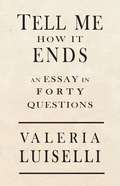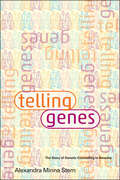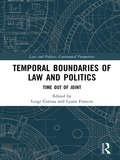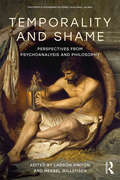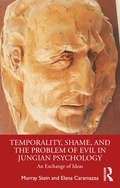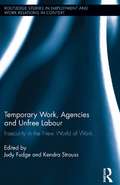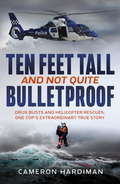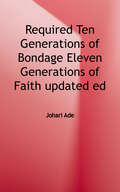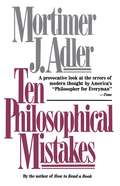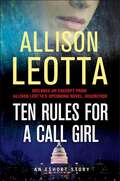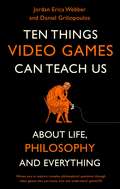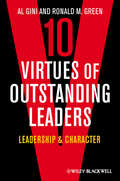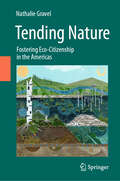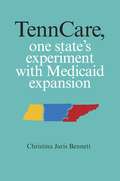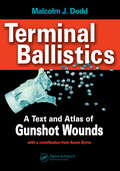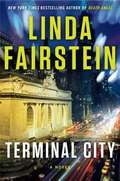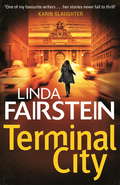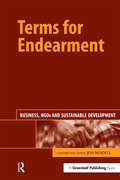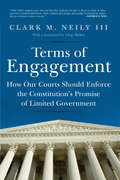- Table View
- List View
Tell Everything
by Sally CooperThe day Pauline sees Ramona’s mug shot in the paper, she knows she’s going to be called upon to relive the darkest period of her life. Charged with murder, Ramona and her husband, Jim, have also been accused of sexually abusing female victims for years in their home. And when the police discover a stash of scripts for disturbing plays performed years earlier by Pauline, Ramona, and Jim, Pauline becomes a key witness in the trial. Tell Everything follows Pauline as she prepares for her testimony, and in the process reawakens memories that she has buried since she was a teenager. But the most difficult challenge she faces is keeping her relationship with her partner, Alex, in tact as he learns for the first time what terrible secrets lurk in her past. Tell Everything is a gripping, agonizingly vivid work from a gifted author who is not afraid to take her reader into the darkest regions of the human soul.
Tell Me How It Ends: An Essay In 40 Questions
by Valeria LuiselliA damning confrontation between the American dream and the reality of undocumented children seeking a new life in the US.
Tell Me No Secrets
by Joy FieldingPeople are inexplicably disappearing from Chicago prosecutor Jess Koster's life. Eight years ago, her mother vanished without a trace and now a client, the victim of a brutal, sadistic rapist, is also missing. Someone is disrupting Jess's neat, ordered existence with chaos and terror. And from the shadow of her past, a maniac is watching her, stalking her - and there's no one Jess can trust, for she feels with blood-chilling certainty that her mysterious tormentor is perilously close . . . and that the next missing person might be her.
Telling Genes: The Story of Genetic Counseling in America
by Alexandra Minna SternThe history of contemporary genetic counseling, including its medical, personal, and ethical dimensions.Winner of the CHOICE Outstanding Academic Title of the Choice ACRLFor sixty years genetic counselors have served as the messengers of important information about the risks, realities, and perceptions of genetic conditions. More than 2,500 certified genetic counselors in the United States work in clinics, community and teaching hospitals, public health departments, private biotech companies, and universities. Telling Genes considers the purpose of genetic counseling for twenty-first century families and society and places the field into its historical context.Genetic counselors educate physicians, scientific researchers, and prospective parents about the role of genetics in inherited disease. They are responsible for reliably translating test results and technical data for a diverse clientele, using scientific acumen and human empathy to help people make informed decisions about genomic medicine.Alexandra Minna Stern traces the development of genetic counseling from the eugenics movement of the early twentieth century to the current era of human genomics. Drawing from archival records, patient files, and oral histories, Stern presents the fascinating story of the growth of genetic counseling practices, principles, and professionals.
Temporal Boundaries of Law and Politics: Time Out of Joint (Law and Politics)
by Luigi Corrias Lyana FrancotIn the last decade, the changing role of time in society has once again taken centre stage in the academic debate. A prominent, but surely not the only, aspect of this debate hinges on the so-called acceleration of time and its societal consequences. Despite the fact that time is fundamental to the way in which law and politics function, the influence of the contemporary experience of time on law and politics remains underdeveloped. How, for example, does society’s structural acceleration impact on justice? Does law actually offer stability and predictability in an ever-changing global world? How can legal and political institutions function in the wake of ever-increasing uncertainty? Both law and politics employ time to order society but they are also limited in what can be effectuated by time. It is this very tension between temporal possibilities and limitations that the contributors to this collection – drawn from different fields of law, as well as from other disciplines – examine.
Temporality and Shame: Perspectives from Psychoanalysis and Philosophy (Philosophy and Psychoanalysis)
by Ladson Hinton Hessel WillemsenWinner of the 2018 American Board and Academy of Psychoanalysis (ABAPsa) prize for best Edited book Temporality has always been a central preoccupation of modern philosophy, and shame has been a major theme in contemporary psychoanalysis. To date, however, there has been little examination of the critical connection between these core experiences. Although they deeply implicate each other, no single book has focused upon their profound interrelationship. Temporality and Shame highlights the many dimensions of that reality. A core point of this book is that shame can be a teacher, and a crucial one, in evaluating our ethical and ontological position in the world. Granting the fact that shame can be toxic and terrible, we must remember that it is also what can orient us in the difficult task of reflection and consciousness. Shame enables us to become more fully present in the world and authentically engage in the flow of temporality and the richness of its syncopated dimensionality. Such a deeply honest ethos, embracing the jarring awareness of shame and the always-shifting temporalities of memory, can open us to a fuller presence in life. This is the basic vision of Temporality and Shame. The respective contributors discuss temporality and shame in relation to clinical and theoretical aspects of psychoanalysis, philosophy, anthropology, and genocide, as well as the question of evil, myth and archetype, history and critical studies, the ‘discipline of interiority’, and literary works. Temporality and Shame provides valuable insights and a rich and engaging variety of ideas. It will appeal to psychotherapists and psychoanalysts, philosophers and those interested in the basic philosophical grounds of experience, and anthropologists and people engaged in cultural studies and critical theory.
Temporality, Shame, and the Problem of Evil in Jungian Psychology: An Exchange of Ideas
by Murray Stein Elena CaramazzaIn a unique epistolary style, authors Murray Stein and Elena Caramazza share their rich and reflective conversations surrounding the themes of temporality, shame, and evil through letters, essays, and email correspondence. Ignited by Wolfgang Pauli’s "The Piano Lesson," Stein and Caramazza study the function of temporality and consider the importance of shame and evil to this relationship. In this book Stein shows how Pauli, as a result of his contact with C.G. Jung and analytical psychology, embarked on a thought experiment to merge two currents of scientific thought: quantum physics and depth psychology. In his work of active imagination "The Piano Lesson," Pauli playfully brings together the former, which supplies a causal explanation of the mechanics of the material world, and the latter, which supplies an approach to meaning. The problem of how to merge the two currents in one language is presented in Pauli’s symbolic solution, piano music, which combines the black and white keys in a single harmony. This music symbolizes a unified theory that combines the explanations of causality and the meaning delivered by synchronicity. Presenting an original approach to synchronicity and dis-synchronicity, this interdisciplinary and innovative exchange concludes with a script written by Murray Stein, inspired by Pauli, as well as an afterword by influential Jungian scholars. This book will be a key reference for undergraduate and postgraduate courses and seminars in Jungian and post-Jungian studies, philosophy, psychoanalytic studies, psychology, and the social sciences.
Temporary Work, Agencies and Unfree Labour: Insecurity in the New World of Work (Routledge Studies in Employment and Work Relations in Context)
by Judy Fudge Kendra StraussUnfree labor has not disappeared from advanced capitalist economies. In this sense the debates among and between Marxist and orthodox economic historians about the incompatibility of capitalism and unfree labor are moot: the International Labour Organisation has identified forced, coerced, and unfree labor as a contemporary issue of global concern. Previously hidden forms of unfree labor have emerged in parallel with several other well-documented trends affecting labor conditions, rights, and modes of regulation. These evolving types of unfree labor include the increasing normalization of contingent work (and, by extension, the undermining of the standard contract of employment), and an increase in labor intermediation. The normative, political, and numerical rise of temporary employment agencies in many countries in the last three decades is indicative of these trends. It is in the context of this rapidly changing landscape that this book consolidates and expands on research designed to understand new institutions for work in the global era. This edited collection provides a theoretical and empirical exploration of the links between unfree labor, intermediation, and modes of regulation, with particular focus on the evolving institutional forms and political-economic contexts that have been implicated in, and shaped by, the ascendency of temp agencies. What is distinctive about this collection is this bi-focal lens: it makes a substantial theoretical contribution by linking disparate literatures on, and debates about, the co-evolution of contingent work and unfree labor, new forms of labor intermediation, and different regulatory approaches; but it further lays the foundation for this theory in a series of empirically rich and geographically diverse case studies. This integrative approach is grounded in a cross-national comparative framework, using this approach as the basis for assessing how, and to what extent, temporary agency work can be considered unfree wage labor
Ten Basic Responsibilities of Nonprofit Boards
by Richard T. IngramBoardSource's all-time bestseller, this book not only explores the board's 10 core responsibilities, it also puts them into the context of the governance challenges facing nonprofits today. The book clarifies and distinguishes the board's responsibilities from those of the chief executive and senior staff. In addition, it includes two appendixes, one covering the individual responsibilities of board members and the other providing a sample self-assessment for individual board members.
Ten Feet Tall and Not Quite Bulletproof: Drug Busts and Helicopter Rescues – One Cop's Extraordinary True Story
by Cameron HardimanCameron Hardiman lived a life most young boys could only dream of. Every morning he put on a navy blue police flight suit, grabbed his flight helmet, and prepared to work on the police helicopter. He could be called to anything during a shift, to search for a missing child, to pull an injured driver from a wrecked car, or a dangerous sea rescue. He saw his fair share of trauma and dealt with it like most coppers would: he quickly put each dangerous job out of his mind as soon as it was over. But one particular rescue in Bass Strait brought about a reckoning - and Cameron was never the same again.This is the brilliantly told, white-knuckle story of one cop learning every lesson the hard way - and coming to find out that being not quite bulletproof doesn't mean that you're not a good cop.
Ten Generations of Bondage Eleven Generations of Faith: The Lewis and Green Family History
by Johari AdeTen Generations of Bondage is the true story about an African American family from enslavement to the 21st century. <p><p>The Lewis-Green historical account begins in 1740 when a freeborn Violet sues her employer for unjustly keeping her in bondage. It continues to the year 2012 in the midst of the re-election campaign of Barack Obama, the first African American President. Although the family somehow manages to keep the faith throughout the years, this book takes the reader through unimaginable atrocities that the family must face over the next generations as they journey to the new millennium. <p><p>The author proves that fact is stranger than fiction as the reader learns the story of Syntha, who was sold at least six times; Kitty, a proud African kidnapped from her homeland and arriving in America in chains; and Tom, a Native American who was enslaved while attempting to rescue his wife from it. Even after "freedom" the family must face lynching, murder and many other challenges as they desperately attempt to reconnect their fragmented families. <p><p>Ten Generations of Bondage keeps the reader engaged as the family navigates through the horrors of slavery, the challenges of emancipation, the degradation of Jim Crow, achievements of the civil rights movements, and the demoralization of modern day racism. Despite the degree or the type of bondage, the Lewis-Green family always manages to keep the faith. <p><p>This is a must-read for genealogists, family historians, and anyone wishing to explore the richness of the African American Family.
Ten Philosophical Mistakes
by Mortimer J. AdlerAn illuminating critique of modern thought from America's "Philosopher for Everyman" (Time).Ten Philosophical Mistakes examines ten errors in modern thought and shows how they have led to serious consequences in our everyday lives. It teaches how they came about, how to avoid them, and how to counter their negative effects.
Ten Rules for a Call Girl: An eShort Story
by Allison LeottaFrom former federal sex-crimes prosecutor Allison Leotta, an eShort story about the secret life of Washington, D.C.'s highest-paid escorts.Beautiful Georgetown undergrad Caroline McBride almost has it all--a loving fiancée, a promising academic career, and a college life of fabulous parties--but she can't afford it. When her father becomes ill, plunging her family into debt, she reluctantly agrees to meet Madeleine, the madam of a high-end escort service. Catering to the most powerful men in D.C., Caroline can make more money in one night than in a month at her part-time college job. And no one has to know. All she has to do is follow the madam's ten simple rules. A riveting story of D.C.'s red-light underworld and the life of a modern courtesan, Ten Rules for a Call Girl is fascinating and addictive. Includes an excerpt from Allison Leotta's new novel, Discretion!
Ten Things Video Games Can Teach Us: (about life, philosophy and everything)
by Jordan Erica Webber Daniel GriliopoulosWOULD YOU KILL ONE PERSON TO SAVE FIVE OTHERS?If you could upload all of your memories into a machine, would that machine be you? Is it possible we're all already artificial intelligences, living inside a simulation?These sound like questions from a philosophy class, but in fact they're from modern, popular video games. Philosophical discussion often uses thought experiments to consider ideas that we can't test in real life, and media like books, films, and games can make these thought experiments far more accessible to a non-academic audience. Thanks to their interactive nature, video games can be especially effective ways to explore these ideas.Each chapter of this book introduces a philosophical topic through discussion of relevant video games, with interviews with game creators and expert philosophers. In ten chapters, this book demonstrates how video games can help us to consider the following questions:1. Why do video games make for good thought experiments? (From the ethical dilemmas of the Mass Effect series to 'philosophy games'.)2. What can we actually know? (From why Phoenix Wright is right for the wrong reasons to whether No Man's Sky is a lie.)3. Is virtual reality a kind of reality? (On whether VR headsets like the Oculus Rift, PlayStation VR, and HTC Vive deal in mass-market hallucination.)4. What constitutes a mind? (From the souls of Beyond: Two Souls to the synths of Fallout 4.)5. What can you lose before you're no longer yourself? (Identity crises in the likes of The Swapper and BioShock Infinite.)6. Does it mean anything to say we have choice? (Determinism and free will in Bioshock, Portal 2 and Deus Ex.)7. What does it mean to be a good or dutiful person? (Virtue ethics in the Ultima series and duty ethics in Planescape: Torment.)8. Is there anything better in life than to be happy? (Utilitarianism in Bioshock 2 and Harvest Moon.)10. How should we be governed, for whom and by who? (Government and rights in Eve Online, Crusader Kings, Democracy 3 and Fable 3.)11. Is it ever right to take another life? And how do we cope with our own death? (The Harm Thesis and the good death in To The Moon and Lost Odyssey.)
Ten Things Video Games Can Teach Us: (about life, philosophy and everything)
by Jordan Erica Webber Daniel GriliopoulosWOULD YOU KILL ONE PERSON TO SAVE FIVE OTHERS?If you could upload all of your memories into a machine, would that machine be you? Is it possible we're all already artificial intelligences, living inside a simulation?These sound like questions from a philosophy class, but in fact they're from modern, popular video games. Philosophical discussion often uses thought experiments to consider ideas that we can't test in real life, and media like books, films, and games can make these thought experiments far more accessible to a non-academic audience. Thanks to their interactive nature, video games can be especially effective ways to explore these ideas.Each chapter of this book introduces a philosophical topic through discussion of relevant video games, with interviews with game creators and expert philosophers. In ten chapters, this book demonstrates how video games can help us to consider the following questions:1. Why do video games make for good thought experiments? (From the ethical dilemmas of the Mass Effect series to 'philosophy games'.)2. What can we actually know? (From why Phoenix Wright is right for the wrong reasons to whether No Man's Sky is a lie.)3. Is virtual reality a kind of reality? (On whether VR headsets like the Oculus Rift, PlayStation VR, and HTC Vive deal in mass-market hallucination.)4. What constitutes a mind? (From the souls of Beyond: Two Souls to the synths of Fallout 4.)5. What can you lose before you're no longer yourself? (Identity crises in the likes of The Swapper and BioShock Infinite.)6. Does it mean anything to say we have choice? (Determinism and free will in Bioshock, Portal 2 and Deus Ex.)7. What does it mean to be a good or dutiful person? (Virtue ethics in the Ultima series and duty ethics in Planescape: Torment.)8. Is there anything better in life than to be happy? (Utilitarianism in Bioshock 2 and Harvest Moon.)10. How should we be governed, for whom and by who? (Government and rights in Eve Online, Crusader Kings, Democracy 3 and Fable 3.)11. Is it ever right to take another life? And how do we cope with our own death? (The Harm Thesis and the good death in To The Moon and Lost Odyssey.)
Ten Virtues of Outstanding Leaders
by Ronald M. Green Al GiniWhat makes a good leader? Ten leaders, ten key virtuesThis readable distillation of the core common features of successful leaders shows how an individual's character, and especially their virtue, is the defining factor. Without these ten vital virtues, leadership becomes "misleadership." The authors, both renowned business ethicists, combine theory with fascinating biographical detail on exemplary leaders such as Abraham Lincoln, Winston Churchill, and Oprah Winfrey. The result is an accessible text on the ethics of leadership which, unlike many publications that claim to reveal the secrets of success as a leader, is informed by a wealth of exceptional academic experience.
Tending Nature: Fostering Eco-Citizenship in the Americas
by Nathalie GravelThis book aims to enhance understanding of the foundational principles and ethical considerations of citizen engagement in environmental conservation through an examination of successful cases of shared environmental governance in the Americas. It seeks to inform policymaking on strategies for fostering behavioral change and advancing towards co-management of national public resources and the commons. These cases are analyzed through a geographical lens to provide a framework for reimagining eco-citizenship grounded in bioregionalism. This perspective diverges from the notion of eco-citizenship as a universal culture, advocating instead for its integration within the collective habitats of citizen groups. Readers will gain insights into fostering reconciliation between nature and humanity by empowering diverse stakeholders to lead Blue/Green/Bee conservation initiatives. Emphasizing community learning, environmental awareness, and citizen participation, the book enriches decision-making processes and promotes environmental justice for all living organisms. The selected case studies from Brazil, Canada, Costa Rica, Mexico, and the United States highlight pioneering innovations in Blue/Green/Bee policy planning across urban, periurban, and rural settings. These initiatives propose empathetic and respectful approaches to nurturing our natural surroundings, including methods for co-management, networked urban gardening, wild native bee conservation, water source protection, community-based water management, river revitalization, and metropolitan green space stewardship. This book will be invaluable to students, urban and rural planners, researchers, academics, networking professionals, policymakers, international development practitioners, environmental organization personnel, and enthusiasts of the natural world alike.
TennCare, One State's Experiment with Medicaid Expansion
by Christina BennettA history of the struggle among competing stakeholders in one of the oldest and most controversial experiments in US health care policy, a precursor to ObamacareIn 1993, Tennessee launched a reform initiative designed to simultaneously expand the proportion of residents with health insurance and curtail cost increases. It was guided by principles that nearly match those that guided the creation of the Affordable Care Act, also known as Obamacare. Like the ACA, TennCare used corporations, rather than a single government payer, to implement the plan, and it relied on a mix of managed care, market competition, and government regulation. While many states cut back on their Medicaid enrollments from 1993 to 2001, TennCare grew from 750,000 to 1.47 million enrollees. The state was less successful in controlling costs, however. Each major stakeholder group (the state, the managed care organizations, the providers, and the enrollees and their advocates) pushed back against parts of the state's strategy that adversely affected their interests, and they eventually dismantled the mechanisms of cost constraint. The author lays out the four stakeholder perspectives for each period in the history of TennCare and provides a link to difficult-to-access primary documents.
TennCare, One State's Experiment with Medicaid Expansion
by Christina Juris BennettA history of the struggle among competing stakeholders in one of the oldest and most controversial experiments in US health care policy, a precursor to Obamacare. In 1993, Tennessee launched a reform initiative designed to simultaneously expand the proportion of residents with health insurance and curtail cost increases. It was guided by principles that nearly match those that guided the creation of the Affordable Care Act, also known as Obamacare. Like the ACA, TennCare used corporations, rather than a single government payer, to implement the plan, and it relied on a mix of managed care, market competition, and government regulation. While many states cut back on their Medicaid enrollments from 1993 to 2001, TennCare grew from 750,000 to 1.47 million enrollees. The state was less successful in controlling costs, however. Each major stakeholder group (the state, the managed care organizations, the providers, and the enrollees and their advocates) pushed back against parts of the state's strategy that adversely affected their interests, and they eventually dismantled the mechanisms of cost constraint. The author lays out the four stakeholder perspectives for each period in the history of TennCare and provides a link to difficult-to-access primary documents.
Tennessee Comprehensive Driver License Manual
by Tennessee Department of Safety Homeland SecurityThe purpose of this manual is to provide a general understanding of the safe and lawful operation of a motor vehicle.
Terminal Ballistics: A Text and Atlas of Gunshot Wounds
by Malcolm J. DoddTerminal Ballistics: A Text and Atlas of Gunshot Wounds begins with a presentation of basic firearms (rifle, pistol, and shotgun) and examines fundamental components of ammunition rounds. The second part of the book deals with the varied patterns of gunshot injury, beginning with the concept of the pathological range of fire determination. Pattern injuries sustained after discharge from handguns, shotguns, and black powder weapons are presented in depth. Further chapters detail more obscure injuries such as those from homemade weapons. The final section deals with more technical aspects of wound examination, including gunshot injury in war and crimes against humanity.
Terminal City (Alex Cooper #16)
by Linda FairsteinWith her newest Alexandra Cooper novel, Terminal City, New York Times bestselling author Linda Fairstein delivers another breakneck thriller that captures the essence of New York City--its glamour, its possibilities, and its endless capacity for darkness.<P><P>Linda Fairstein is well-known for illuminating the dark histories in many of New York's forgotten corners--and sometimes in the city's most popular landmarks. In Terminal City, Fairstein turns her attention to one of New York's most iconic structures--Grand Central Terminal.From the world's largest Tiffany clock decorating the 42nd Street entrance to its spectacular main concourse, Grand Central has been a symbol of beauty and innovation in New York City for more than one hundred years. But "the world's loveliest station" is hiding more than just an underground train system. <P>When the body of a young woman is found in the tower suite of the Waldorf Astoria--one of the most prestigious hotels in Manhattan--Assistant DA Alex Cooper and Detectives Mike Chapman and Mercer Wallace find themselves hunting for an elusive killer whose only signature is carving a carefully drawn symbol into his victims' bodies, a symbol that bears a striking resemblance to train tracks. When a second body bearing the same bloody symbol is discovered in a deserted alleyway right next to the terminal building, all attention shifts to the iconic transportation hub, where the potential for a bigger attack weighs heavily on everyone's minds. <P>With the President of the United States set to arrive for a United Nations meeting at the week's end, Alex and Mike must contend with Grand Central's expansive underground tunnels and century-old dark secrets--as well as their own changing relationship--to find a killer who appears to be cutting a deadly path straight to the heart of the city.
Terminal City: Number 16 In Series (Alexandra Cooper #16)
by Linda FairsteinWith her latest Alexandra Cooper novel, Terminal City, New York Times bestselling author Linda Fairstein delivers another breakneck thriller that captures the essence of New York City -- its glamour, its possibilities, and its endless capacity for darkness.Grand Central Terminal is the very centre of the city. It's also the sixth most visited tourist attraction in the world. From the world's largest Tiffany clock decorating the Forty-Second Street entrance to using electric trains since the early 1900s, Grand Central has been a symbol of beauty and innovation in New York City for more than one hundred years.But 'the world's loveliest station' is hiding more than just an underground train system, and in Terminal City, Alex Cooper and Mike Chapman must contend with Grand Central's dark secrets as well as their own changing relationship.
Terms for Endearment: Business, NGOs and Sustainable Development
by Jem BendellBusiness and NGOs are seen by many to be locked in a perpetual war of values and ideologies. What this book demonstrates is that the war has moved on. Many companies are now engaging with their stakeholders – even those with which they have traditionally had antagonistic relationships – as part of their strategies for improved social and environmental performance. With contributions from an outstanding and diverse group of experts from business, consultancy, research institutes, NGOs and academia, Terms for Endearment investigates the how and why of these new collaborations and provides concrete examples of business working with stakeholder pressure for sustainable development. The book forcibly argues the notion of organizations of civil society setting the standards for business behaviour in the 21st century. For those companies that choose not to pursue high standards of social and environmental performance, confrontation with NGOs must be expected, with negative consequences for sales, costs and social capital, i.e. the bottom line. Terms for Endearment therefore presents business with both a threat and opportunity as we move closer to establishing a social basis for global economic activity.
Terms of Engagement
by Clark M. Neily IIIThe Constitution was designed to limit government power and protect individuals from the tyranny of majorities and interest-group politics. But those protections are meaningless without judges who are fully committed to enforcing them, and America's judges have largely abdicated that responsibility. All too often, instead of judging the constitutionality of government action, courts simply rationalize it, as the Supreme Court did in upholding the Affordable Care Act, which represented the largest-and most blatantly unconstitutional-expansion of federal power since the New Deal.The problem lies not with the Constitution, but with courts' failure to properly enforce it. From the abandonment of federalism to open disregard for property rights and economic freedom, the Supreme Court consistently protects government prerogatives at the expense of liberty. The source of this error lies in the mistaken belief on both the left and the right that the leading constitutional value is majority rule and the chief judicial virtue is reflexive deference to other branches of government. This has resulted in a system where courts actually judge the constitutionality of government action in the handful of cases they happen to care about, while merely pretending to judge in others.The result has been judicial abdication, removing courts from their essential role in the system of checks and balances so carefully crafted by our Founders. This book argues that principled judicial engagement-real judging in all cases with no exceptions-provides the path back to constitutionally limited government.

